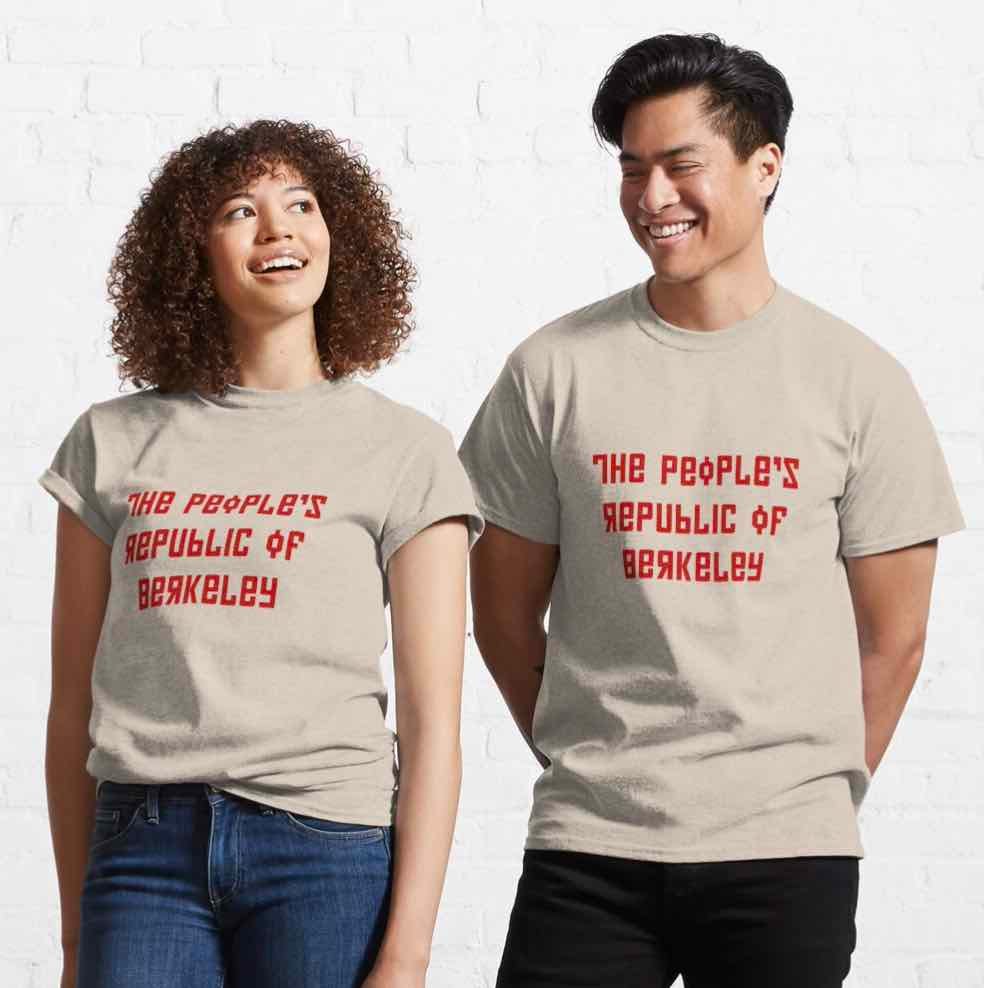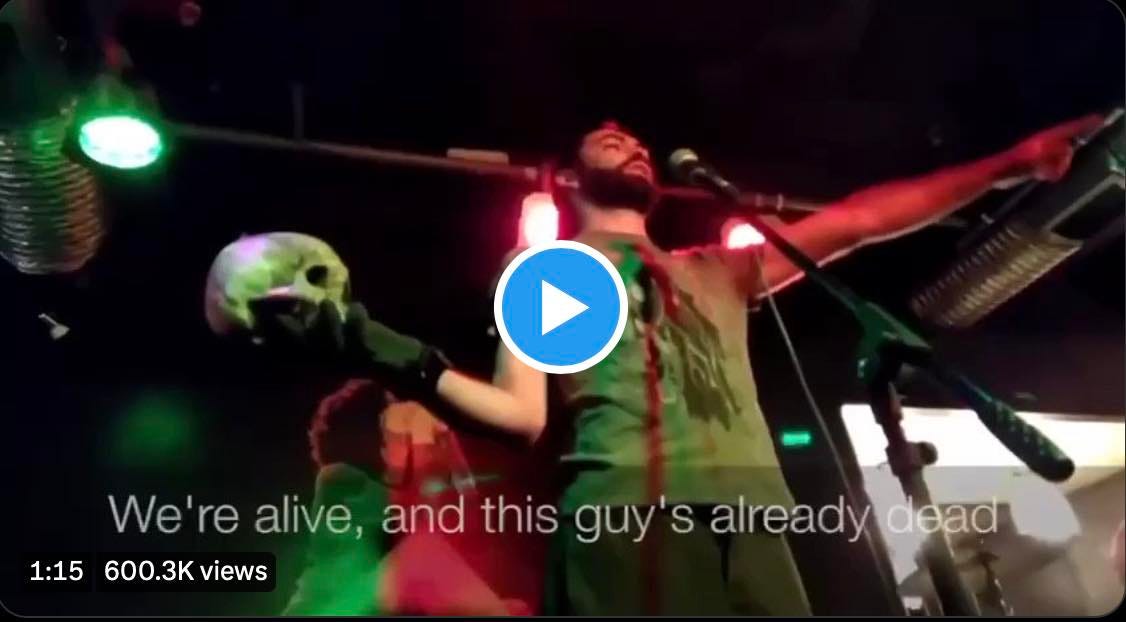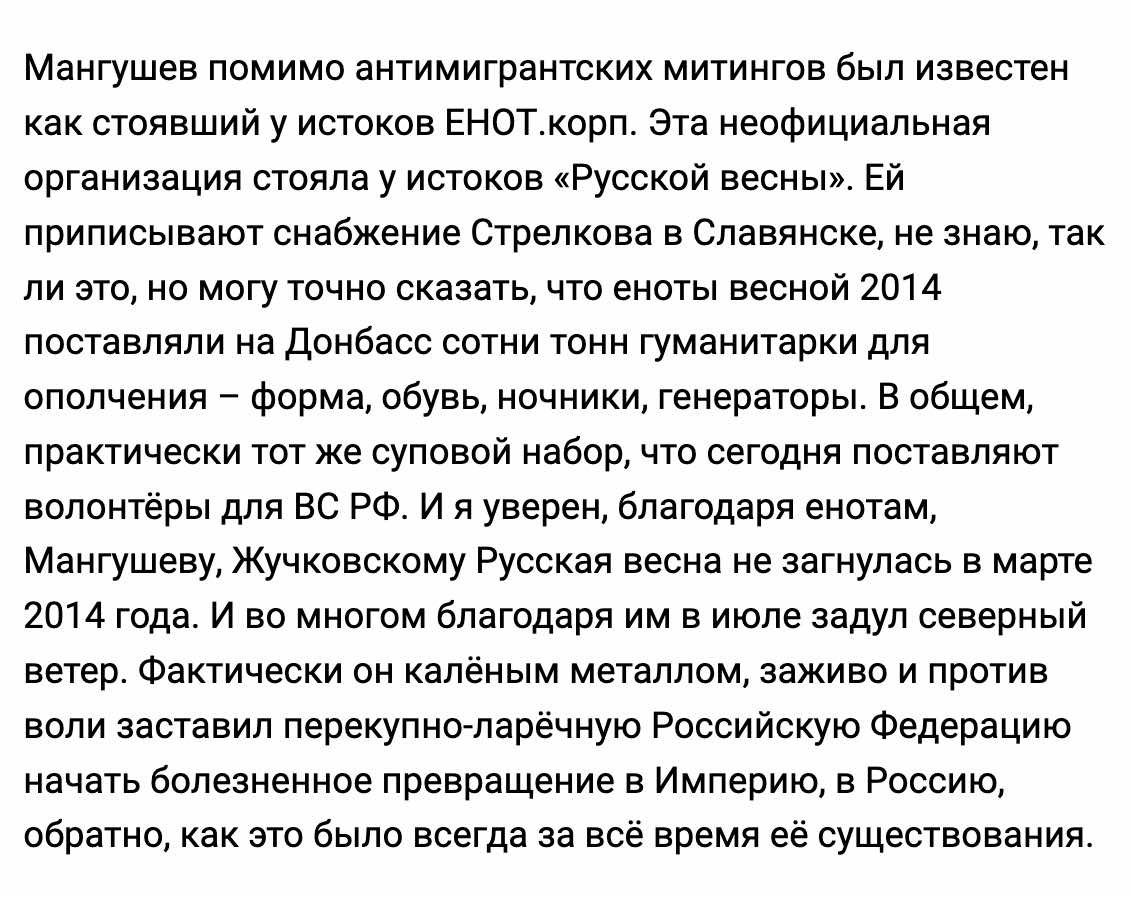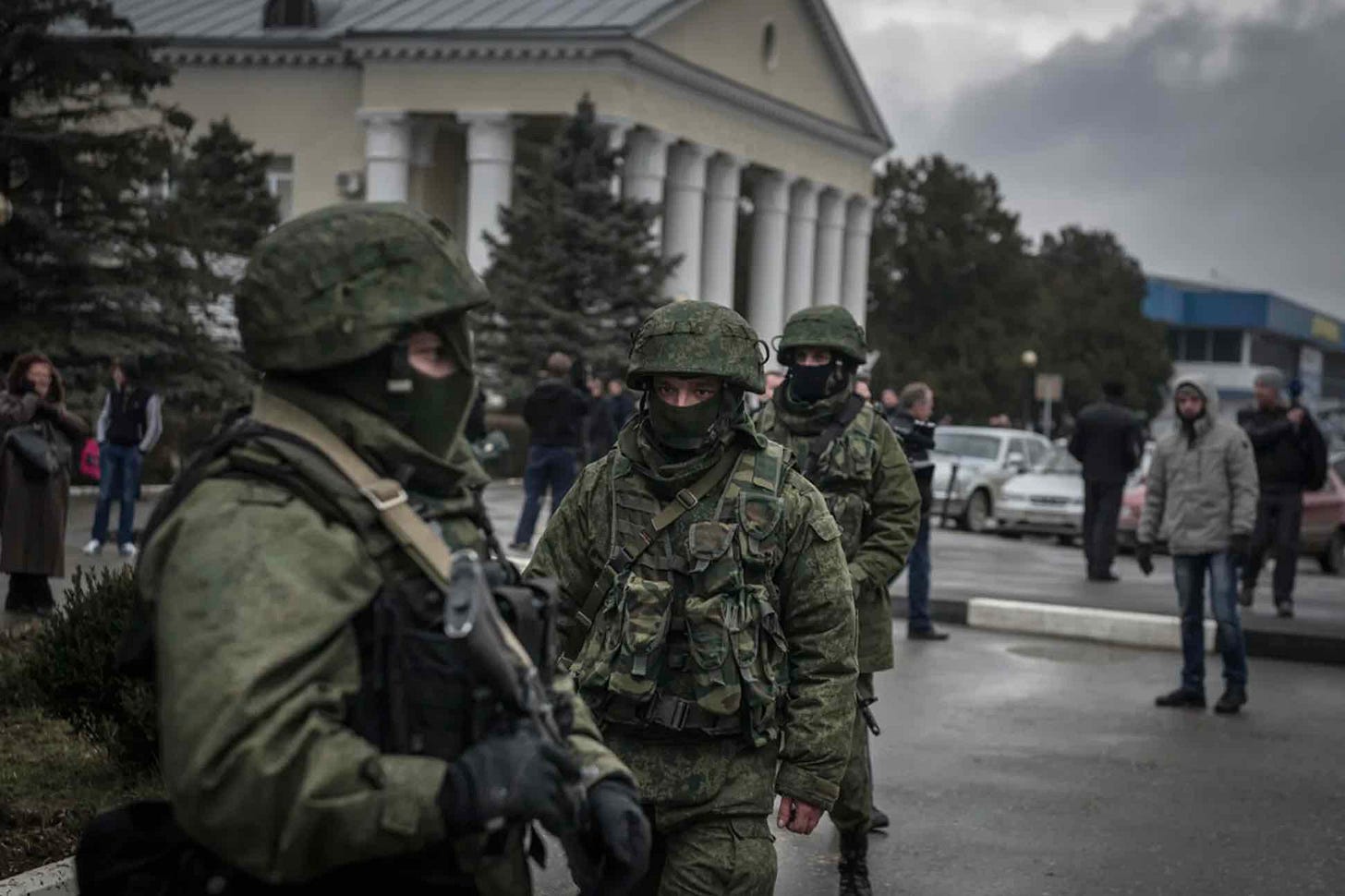The myth of the Donbas separatism
"Cause I'm TNT, I'm dynamite. TNT, and I'll win the fight"
In the ancient tradition of good debate, where you should first summarise your opponent’s thesis - to make sure you understand it correctly - and attempt to refute it afterwards, I will begin with the summary of the “separatism myth”.
People of Donbas wanted to secede from Ukraine for a long time. In 2014 they did, they rebelled and proclaimed their own republics. Ukraine is bad because it did not recognize them and Russia has every right to help them.
The funniest thing is that this myth exists solely in the West. There’s is a huge difference between “export” and “domestic” versions of Russian propaganda.
When they write about the war in Donbas (2014-2022), they don’t try to hide that actually there was no local rebellion. They describe it as an action of paramilitary group, led by Igor Girkin - a man who has no personal connection with Ukraine or Donbas (he lives in Moscow, where he was probably born).
Girkin was sent to Ukraine by the Russian secret services, with a bunch of thugs. He attacked the government buildings in Slavyansk, took the employees as hostages and proclaimed the separatist republic. He was subsequently forced out of the city, but as his gang received help from Russia, they managed to establish a line of contact that pretty much prevailed until 2022 (and actually in the vicinity of Donyetsk, it didn’t change that much).
So where are the local separatists in this narrative? Nowhere. They just never existed (as a political movement, not as a joke, such as American students proclaiming their campus an independent state).
via redbubble.com
Last week one Igor Mangushev, a person particularly disgusting even by Russian standards, was killed in murky circumstances in Luhansk. Apparently, he was shot point blank in the head, execution style. Someone dropped him at the hospital, where he died. At the time of writing, nothing more is known for certain (but the Russian internet is full of rumours).
He achieved international notoriety when at the initial phase of the invasion, at which time they still thought they were winning, he performed a weird stand-up routine during a rock concert, mocking a skull of a fallen Ukrainian soldier (or at least he claimed it to be one - maybe he just robbed a random grave).
via youtube.com
Apparently Mangushev was the mastermind behind using letters Z, O and V as military symbols of the invasion. The most popular was the first one and it became a symbol of Russian imperialism. It was his idea to use Latin letters instead of their Cyryllic equivalents, maybe because he understood Russian propaganda can convince only people who don’t read Cyryllic.
Mangushev was important enough to inspire a series of touching, personal obituaries from military bloggers, official Russian media and veterans of the previous invasion of 2014. These obituaries were, of course, written in Russian, for Russian audiences. Check the quote below (from an obituary written by one Roman Saponkov).
via telegram channel of @rsaponkov
Saponkov is praising Mangushev as someone who jumpstarted the transformation of mediocre Russian Federation into Russian Empire, the real Russia, the way she was meant to be “for the entire time of her existence”. This single sentence should give some “food for thought” for all those who subscribe to the Waters-Chomsky-Musk delusion that “Putin is a rational, democratic leader merely wanting to protect the persecuted population of Donbas”.
At this point I actually agree with Saponkov: this war is not about Donbas or Shmonbas. It’s about the recreation of the tzarist empire.
According to Saponkov, Mangushev was the key person why the whole Donbas operation did not collapse in July 2014. When Strelkov (Girkin) troops lost control of Sloviansk, their original capital, Mangushev saved them with his supplies. Without him the “Russian spring” (as many Russians call the initial invasion of March 2014) would have ended in “March 2014”.
I understand this is an obituary, so the deceased person’s merits are exaggerated, because “de mortuis yadda yadda” but Saponkov cannot have made it up entirely. After all, other people who remember that time, who were with Strelkov/Girkin in Sloviansk (such as Simon Pegov / Wargonzo) read this and collaborate with Saponkov. Girkin reads this. And his story is more or less coherent with other obituaries for Mangushev.
So, let me reiterate. The whole separatism would have ended before it even started if not a Moscow-born Muscovite Mangushev who delivered crucial supplies to a Moscow-born Muscovite Girkin. What kind of separatism is that?
Of course, when I said “there was no separatism prior to Girkin’s invasion”, I will get a predictable comment from a predictable commentator, who would hastily google some Ivan Ivanovich Ivanov, who was also a separatist. Given expectations low enough, you will find someone supporting any fringe cause.
During my trips to America, I actually met people talking in jest of “People’s Republic of Berkeley”, or even sporting t-shirts with this slogan. Does it mean there exists Berkeley separatism in California?
Never been to Montana, but I heard of far right militia camps there. And they sometimes indeed reject the federal government, and it’s not in jest. But still, does it mean far right separatism is an actual force in Montana politics - can they elect their representatives, senators, sheriffs, mayors? School board perhaps?
I would suggest a common sense criterion that in order to talk about a real separatist movement, it has to (a) be an actual organisation with a name and structure, such as Basque National Liberation Movement, Scottish National Party or Corsica Libera, (b) separatism must be one of the primary political goals of this party/movement, (c) it should be one of the major parties in local politics, electing representatives, mayors etc.; or - if in dictatorship - be able to form a guerrilla or at least a peaceful humanitarian organization able to gather food and clothes (apparently Girkin needed Mangushev to get even the most mundane kinds of supplies).
I’m open to hear other people’s criteria, but if we accept any random dude who screams “I hate the government, I want to secede”, we will find the world full of micro-states wanting to secede. I bet someone sitting in a pub in Birmingham right now declares his will to secede from the UK. Cheers, mate!
None of the above conditions were fulfilled in Donbas before 2014. The main “pro-Russian” party was the Party of Regions. Separatism was never in their political program, nor in the other “pro-Russian” parties active before 2014.
There were people discussing secession, but they never formed a party strong enough to be a serious contender in local politics. And finally: it seems that those people were unable or unwilling to create insurgency with their own means, they needed Russian-born and Russian-based people to do it for them, and later on, regular Russian troops in unmarked uniforms to maintain the line of contact.
Why did Putin need this charade? At that time, he wanted to have a cake and eat a cake. Invade a country while pretending not to.
By sending Girkin thugs to Ukraine, he violated multiple international treaties. Not only the famous Budapest memorandum, but also the Russian-Ukrainian Friendship Treaty of 1997, and a whole bunch of treaties basically outlawing teritorial gains via invasion. The sanctions Russia got in 2022 should actually be applied already in 2014 simply for the violation of Ukrainian teritorial integrity. That’s a big no-no in the international law.
March 2014: The very local separatists, looking so natural they easily blend into the crowd of pedestrians. Ukrainian separatists cheer them with posters saying “WE WANT TO SECEDE”, “WE LOVE PUTIN”, “WE HATE BORSTSCH”. Photo: Sergey Ponomarev via Medusa. NOTE for the visually impaired: I am being sarcastic.
The charade was silly, because the invading forces were clearly just that: invading forces. It was impossible to pretend they are a local insurgency. They sported Russian gear and clothing, almost as if they had a single supply source (could this source be Mangushev? nah, local separatists fah sure!).
Russia denied to have anything to do with the invaders, but where could they come from? From outer space? They were dubbed “little green men” by the international media.
For 8 years it worked. It was nonsense for anyone living nearby, but it was good enough to fool Roger Waters and provide plausible deniability to paid traitors such as Gerhard Schroeder.
If anything good came from the second Russian invasion of 2022, it was Russia’s Scooby Doo moment. Masks off.
Misled by his advisors, Putin probably actually believed that Russian speaking Ukrainians will welcome his army with flowers. With very few exceptions, it never happened.
Take the case of Oleksandr Vilkul - the mayor of largely Russian speaking town of Krivyi Rih. Zelensky comes from this town and he was raised in a Russian speaking family. So was Vilkul, however, he won the election from a party opposing Zelensky.
He was exactly the guy Russians had hoped to meet. On the first day of the invasion, he received calls from his former friends who defected to Russia long ago - urging him to surrender the city and collaborate.
Instead, he helped to organise the first impromptu defences of the city, convinced influential local people (such as business owners) to stay and fight, and he has used his expertise of a mining engineer to blow up the bridges on the approach to the city. It worked, the city held - just like many other Ukrainian towns and cities, defended by the local people, before the army came.
People like Vilkul turned the initial blitzkrieg into a quagmire. He did not welcome Russians with flowers, but with “2 tons of TNT”.
Why? Before the war, there was a joke about two old men in Odessa. “You know Sasha, these days I’m too scared to speak Russian in public”. “Because of the repressions?” “No, because I’m afraid Russians might come to liberate me”.






I would like to add one more thing:
If there were a proper separatist party or organization in Donetsk, its leader would be a natural candidate to lead the new republic. Who is this leader? Who is the best man the Russians could find?
His name is Denis Pushilin, and he actually comes from the Donetsk region. He used to be involved in a financial pyramid, then he was in a party that was formed out of this financial pyramid. In 2013 he ran for a parliament seat in the Kyiv region, receiving a total of 77 votes. Separatism was not an issue for him at this time.
In fact, the pure separatist and the popular politician.
And now Putin admits it was Russian army all the time: https://twitter.com/nexta_tv/status/1651942418139299840